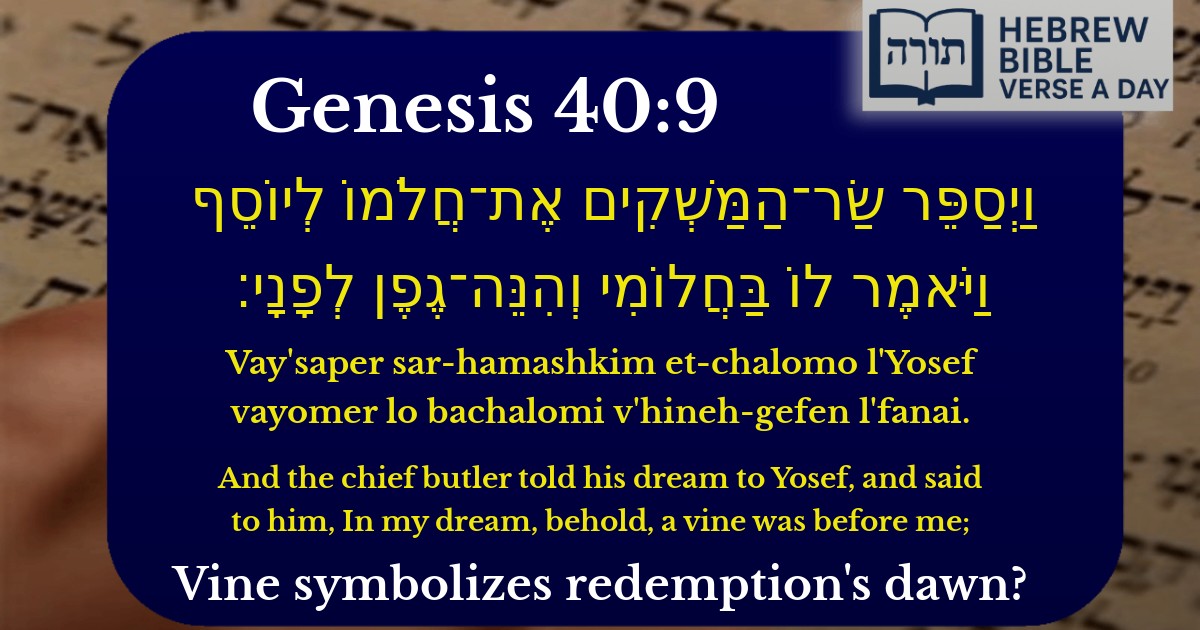Join Our Newsletter To Be Informed When New Videos Are Posted
Join the thousands of fellow Studends who rely on our videos to learn how to read the bible in Hebrew for free!
Hebrew Text
וַיְסַפֵּר שַׂר־הַמַּשְׁקִים אֶת־חֲלֹמוֹ לְיוֹסֵף וַיֹּאמֶר לוֹ בַּחֲלוֹמִי וְהִנֵּה־גֶפֶן לְפָנָי׃
English Translation
And the chief butler told his dream to Yosef, and said to him, In my dream, behold, a vine was before me;
Transliteration
Vay'saper sar-hamashkim et-chalomo l'Yosef vayomer lo bachalomi v'hineh-gefen l'fanai.
Hebrew Leining Text
וַיְסַפֵּ֧ר שַֽׂר־הַמַּשְׁקִ֛ים אֶת־חֲלֹמ֖וֹ לְיוֹסֵ֑ף וַיֹּ֣אמֶר ל֔וֹ בַּחֲלוֹמִ֕י וְהִנֵּה־גֶ֖פֶן לְפָנָֽי׃
וַיְסַפֵּ֧ר שַֽׂר־הַמַּשְׁקִ֛ים אֶת־חֲלֹמ֖וֹ לְיוֹסֵ֑ף וַיֹּ֣אמֶר ל֔וֹ בַּחֲלוֹמִ֕י וְהִנֵּה־גֶ֖פֶן לְפָנָֽי׃
🎵 Listen to leining
Parasha Commentary
📚 Talmud Citations
This verse is quoted in the Talmud.
📖 Berakhot 56a
The verse is referenced in a discussion about dreams and their interpretations, particularly in the context of Joseph's ability to interpret dreams.


Rashi's Explanation of the Vine in the Dream
Rashi (Bereshit 40:9) explains that the vine in the chief butler's dream symbolizes the Jewish people, as the verse in Tehillim (80:9) states, "You plucked up a vine from Egypt." This interpretation connects the dream to the future redemption of the Jewish people from Egypt, hinting at Yosef's eventual role in their salvation. The vine's presence in the dream suggests that the butler's fate is tied to the broader divine plan for Bnei Yisrael.
Symbolism of the Vine in Midrashic Literature
The Midrash (Bereshit Rabbah 88:5) elaborates on the vine's symbolism, teaching that the three branches mentioned later in the dream represent the three Avot (Avraham, Yitzchak, and Yaakov). Just as a vine produces wine that gladdens the heart, the Avot brought joy to the world through their righteousness and service of Hashem. The Midrash further connects this to the butler's eventual restoration to his position, as his dream carried deeper spiritual significance beyond his personal fate.
Rambam's Perspective on Dreams
Rambam (Moreh Nevuchim 2:36) discusses dreams as a form of divine communication, where prophetic visions often use symbolic imagery. In this context, the vine represents growth and fruitfulness, indicating that the butler's dream was not merely a random occurrence but carried a message from Hashem. Yosef's ability to interpret it correctly demonstrated his divine wisdom, a trait of true nevi'im (prophets).
Practical Lessons from the Verse